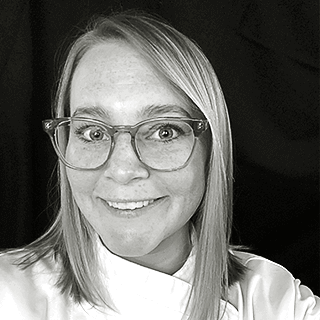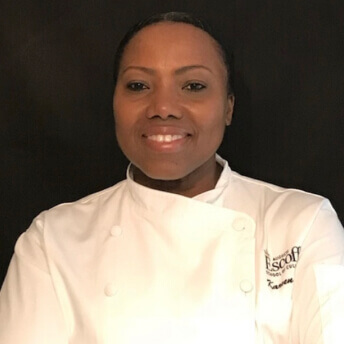Listen to This Article:
Whether you’ve just graduated from pastry school or have spent years baking sweets at home, you may be considering becoming a pastry chef. You may dream of spending your days creating creamy custards or whipping up flaky pastries for a restaurant crowd, but first you need to land a position in the pastry field.
With that in mind, it’s helpful to find out what restaurant managers may look for when hiring a pastry chef. Before you fret about not having everything it takes to land your dream position, recognize that a great pastry chef is made, not born. They are a combination of several important ingredients—just like a recipe.
If you’re missing one or two elements, that’s okay! You may just need to practice the indispensable skills to become a “perfectly baked” pastry chef.
Start with Kitchen Chemistry Competence
Baking and pastry often require more precision than cooking. Unlike culinary arts where the cook or chef can often taste as they go and alter dishes on the fly, pastry often involves following strict ingredient ratios. You may not know if there’s something wrong with a cake or loaf of bread until it comes out of the oven, and by then it could be too late.
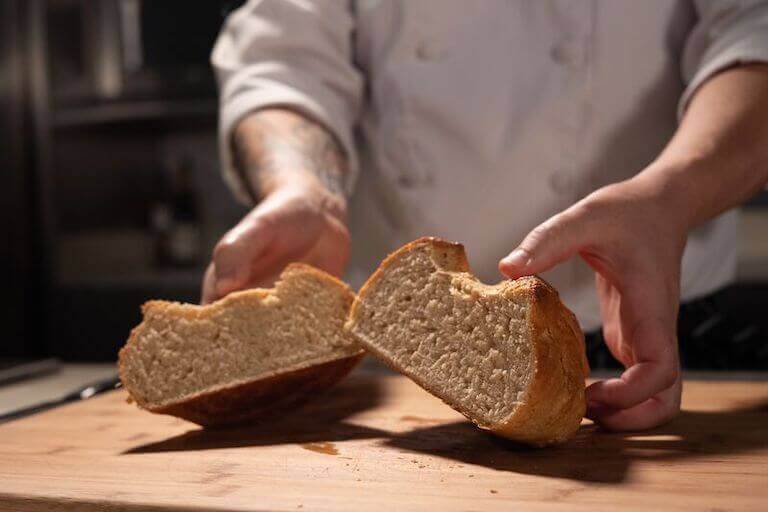
Understanding how the ingredients work in the recipe can make all the difference in your end results when baking.
Although baking involves artistic skills, it’s rooted in science. Ingredients come together to create a chemical reaction that transforms a dough into a loaf of bread or a batter into a cake. So pastry chefs usually need to prove some technical proficiency in order to land the job. Although the ability to bake a loaf of challah bread is valuable, you can yield better results by knowing why the dough rises and how brushing the loaf with butter and an egg wash is effective –making the knowledge of chemistry an integral part of a great finished product.
While in school, Escoffier Baking and Pastry Graduate and Pastry Chef Wes Duckworth learned the importance of understanding the science of baking “Escoffier really teaches you the science behind food,” he says. “You understand what each component does down to the molecular level. It’s a lot easier to change recipes or figure out how it’s going to work because baking is chemistry. It’s just knowing what those ingredients are going to do.”*
*Information may not reflect every student’s experience. Results and outcomes may be based on several factors, such as geographical region or previous experience.
To help explore baking techniques, Escoffier baking and pastry students may complete coursework in baking math, sanitation, cakes, pies and pastries, menu planning, and much more. This education can prove to the hiring manager that the applicant has baseline knowledge of baking principles. Plus, investing in education can show restaurant managers that you’re serious about a career in pastry.
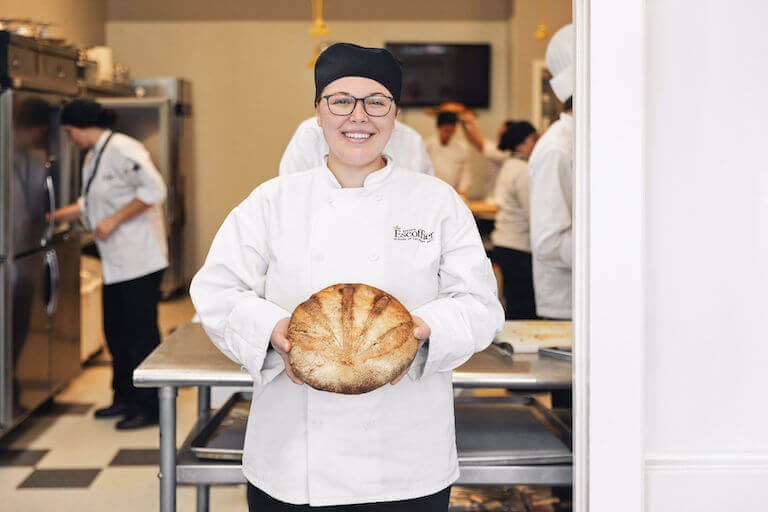
Baking and pastry programs can help you develop key technical skills that can help you get a job as a pastry chef.
Add a Sprinkle of Industry Experience
Some positions in baking and pastry will be entry level. These positions will often be called “baking assistant” or “pastry cook,” rather than “pastry chef.” But in a high-end restaurant with a robust dessert program, the pastry chef may need many years of experience to be considered.
*Information may not reflect every student’s experience. Results and outcomes may be based on several factors, such as geographical region or previous experience.
Even if you begin pastry school at Escoffier with no experience, you can have at least one job to put on your resume by the time you graduate. That’s because all Escoffier students must complete one or two hands-on industry externship before they receive their degree or diploma.
By working in bakeries and kitchens, students can practice their skills and see the kitchen brigade system working in real-time. For some students, the externship position can become a longer-term employment opportunity. For others, it’s an educational stepping stone that can move them one step closer to their end goal.
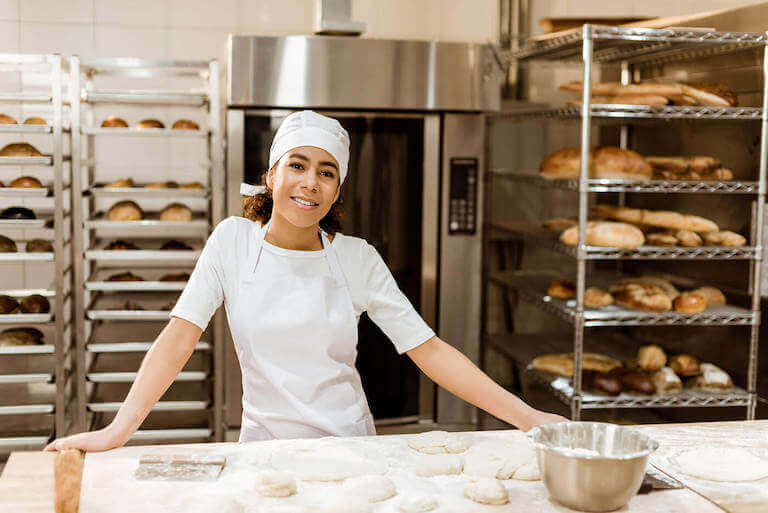
The experience you gain working in a professional kitchen can be irreplaceable when working to further your career as a pastry chef.
Remember—baking and pastry students do not graduate as pastry chefs. Cooks must earn that title through a combination of education and experience. But studying these foundational skills in pastry school may help graduates to progress through their careers as they reach for that ultimate position of pastry chef.
Mix in a Business Mindset
A pastry chef is often in charge of the dessert menu, which goes beyond just the tastiness of the desserts. The dessert menu must be profitable to be sustainable. So the pastry chef has to be able to manage food costs, portion control, and inventory to prevent waste and spoilage.
At Escoffier, Baking & Pastry Arts students can touch on topics like menu design and management, or purchasing and cost control. This coursework may include things like purchasing, receiving, inventory management, and price analysis, which can help graduates design recipes that earn more than they cost.
Pastry chefs may also have a team to manage. So they need to be effective communicators and supervisors who can delegate work and make corrections diplomatically. Escoffier baking and pastry students working toward their associate degree may take Business and Professional Communications, which can help them improve their listening and conflict resolution skills.
Those communication skills aren’t all about delegation, though. It can be just as important to know how to ask for help. Honesty with yourself and with your team can help you continue to thrive and grow as a pastry chef.
“I always like to hire candidates who prioritize teamwork, pull their weight, and help their coworkers,” says Escoffier Pastry Arts Chef Instructor Anastasia Malone and former Pastry Chef at the Five Diamond rated Sandpearl Resort.
Pastry school graduates can continue to build these skills as they progress through their careers.
Don’t Forget Self-Motivation and Dependability
When working as a professional pastry chef, your attitude is as important as your baking skills. “When I was hiring new line cooks,” Escoffier Manager of Content Development Chef Luke Shaffer shares, “I would say, ‘I can teach you how to cook. I can’t teach you how to show up early and be excited to be here.”
Never underestimate the value of showing up every day, on time and ready to work. And don’t just show up—aim to keep progressing both as an individual and as a team.
When a manager or leader isn’t available to find solutions, you need to be able to step up and take charge.
A commitment to personal excellence can be the secret ingredient that helps set you apart. It’s a way for you to show your colleagues that you’re ready to rise to the occasion and help the kitchen team succeed.
Top It Off with a Dash of Creativity
Pastry chefs must be able to execute a recipe, but they may have to create their own inventive new desserts as well. Therefore, managers expect pastry chef candidates to have a strong understanding of flavor development as well as the confidence to be creative in the kitchen.
*Information may not reflect every student’s experience. Results and outcomes may be based on several factors, such as geographical region or previous experience.
In addition to being able to be creative with flavors, pastry chefs must be able to turn desserts into visual masterpieces with the help of intricate piping, delicate icing flowers, and carefully molded chocolate. All this decorative work requires creativity, a deft eye, and the skills to execute these techniques.

Macarons, made by an Escoffier Online Baking and Pastry graduate Kaitlin M., exhibit creativity in both flavor and visual appeal.
Pastry chefs may also be asked to come up with creative uses for “extras.” For example, you may be tasked with repurposing ingredients that are in surplus or don’t quite fit the rest of the menu to help avoid waste. The ability to adapt and create in these situations is crucial—there may not be a recipe to follow. Not only can this skill help you avoid waste, but it can also help you create new and exciting menu offerings. Being resourceful can show your ability to adapt and that you want to contribute to the overall success of the restaurant.
How can applicants prove their creative and decorative chops to hiring managers? As you progress, take plenty of photos of various pastries and desserts to highlight your range of skills and ability to work creatively.
The Recipe for the Perfect Pastry Chef
If you’re worried you don’t have all the components necessary to become a pastry chef, don’t worry. Whether you’ve been baking for years or have just begun exploring the pastry arts, attending pastry school may provide you with the skills and experiences you need to make yourself a more valuable candidate to restaurant managers.
Escoffier baking and pastry students can explore how to bake a beautifully risen cake and silky smooth chocolate mousse, but they also discover why these recipes work. With the knowledge and guidance of professional Chef Instructors, students can experiment with recipes and find their own baking styles.
If you hope to one day become a pastry chef, consider enrolling in one of Escoffier’s baking and pastry programs. With programs in Austin, Boulder, and online, pastry students can get their education from almost anywhere in the world and get started on the pastry career they’ve been dreaming of!
IF YOU’D LIKE TO LEARN MORE ABOUT BAKING AND PASTRY CAREERS, TRY THESE ARTICLES NEXT:
- What Is It Like to Be a Pastry Chef?
- 4 Tips for Opening Your Own Bakery
- Do You Need Pastry School to Be a Pastry Chef?
This article was originally published on April 5, 2021, and has since been updated.
*Information may not reflect every student’s experience. Results and outcomes may be based on several factors, such as geographical region or previous experience.

